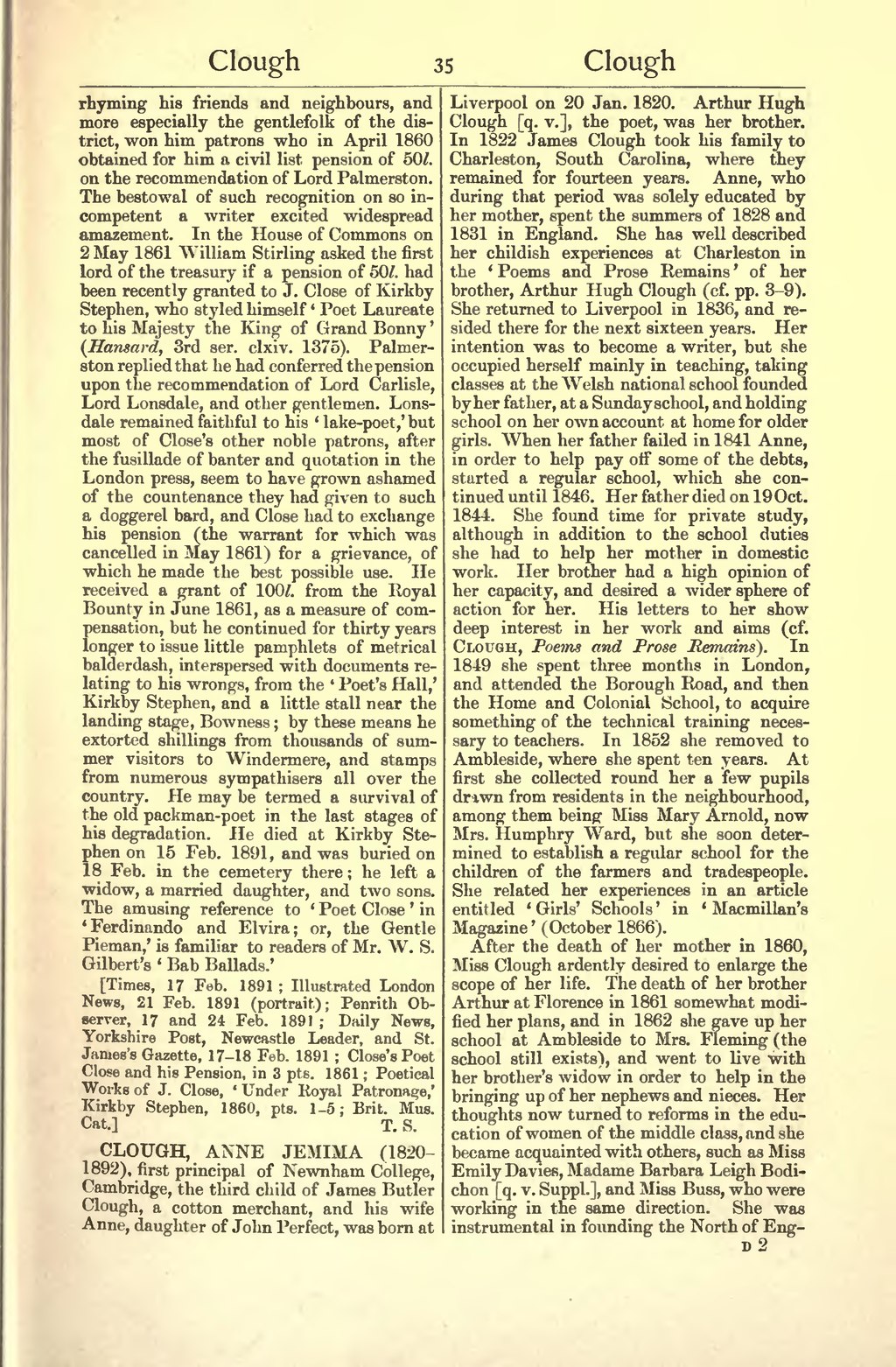rhyming his friends and neighbours, and more especially the gentlefolk of the district, won him patrons who in April 1860 obtained for him a civil list pension of 50l on the recommendation of Lord Palmerston. The bestowal of such recognition on so incompetent a writer excited widespread amazement. In the House of Commons on 2 May 1861 William Stirling asked the first lord of the treasury if a pension of 50l. had been recently granted to J. Close of Kirkby Stephen, who styled himself 'Poet Laureate to his Majesty the King of Grand Bonny' (Hansard, 3rd ser. clxiv. 1375). Palmerston replied that he had conferred the pension upon the recommendation of Lord Carlisle, Lord Lonsdale, and other gentlemen. Lonsdale remained faithful to his 'lake-poet,' but most of Close's other noble patrons, after the fusillade of banter and quotation in the London press, seem to have grown ashamed of the countenance they had given to such a doggerel bard, and Close had to exchange his pension (the warrant for which was cancelled in May 1861) for a grievance, of which he made the best possible use. He received a grant of 100l. from the Royal Bounty in June 1861, as a measure of compensation, but he continued for thirty years longer to issue little pamphlets of metrical balderdash, interspersed with documents relating to his wrongs, from the 'Poet's Hall,' Kirkby Stephen, and a little stall near the landing stage, Bowness; by these means he extorted shillings from thousands of summer visitors to Windermere, and stamps from numerous sympathisers all over the country. He may be termed a survival of the old packman-poet in the last stages of his degradation. He died at Kirkby Stephen on 15 Feb. 1891, and was buried on 18 Feb. in the cemetery there; he left a widow, a married daughter, and two sons. The amusing reference to 'Poet Close' in 'Ferdinando and Elvira; or, the Gentle Pieman,' is familiar to readers of Mr. W. S. Gilbert's 'Bab Ballads.'
[Times, 17 Feb. 1891; Illustrated London News, 21 Feb. 1891 (portrait); Penrith Observer, 17 and 24 Feb. 1891; Daily News, Yorkshire Post, Newcastle Leader, and St. James's Gazette, 17–18 Feb. 1891; Close's Poet Close and his Pension, in 3 pts. 1861; Poetical Works of J. Close, 'Under Royal Patronage,' Kirkby Stephen, 1860, pts. 1–5; Brit. Mus. Cat.]
CLOUGH, ANNE JEMIMA (1820–1892), first principal of Newnham College, Cambridge, the third child of James Butler Clough, a cotton merchant, and his wife Anne, daughter of John Perfect, was born at Liverpool on 20 Jan. 1820. Arthur Hugh Clough [q. v.], the poet, was her brother. In 1822 James Clough took his family to Charleston, South Carolina, where they remained for fourteen years. Anne, who during that period was solely educated by her mother, spent the summers of 1828 and 1831 in England. She has well described her childish experiences at Charleston in the 'Poems and Prose Remains' of her brother, Arthur Hugh Clough (cf. pp. 3–9). She returned to Liverpool in 1836, and resided there for the next sixteen years. Her intention was to become a writer, but she occupied herself mainly in teaching, taking classes at the Welsh national school founded by her father, at a Sunday school, and holding school on her own account at home for older girls. When her father failed in 1841 Anne, in order to help pay off some of the debts, started a regular school, which she continued until 1846. Her father died on 19 Oct. 1844. She found time for private study, although in addition to the school duties she had to help her mother in domestic work. Her brother had a high opinion of her capacity, and desired a wider sphere of action for her. His letters to her show deep interest in her work and aims (cf. Clough, Poems and Prose Remains). In 1849 she spent three months in London, and attended the Borough Road, and then the Home and Colonial School, to acquire something of the technical training necessary to teachers. In 1852 she removed to Ambleside, where she spent ten years. At first she collected round her a few pupils
drawn from residents in the neighbourhood, among them being Miss Mary Arnold, now Mrs. Humphry Ward, but she soon determined to establish a regular school for the children of the farmers and tradespeople. She related her experiences in an article entitled 'Girls' Schools' in 'Macmillan's Magazine' (October 1866).
After the death of her mother in 1860, Miss Clough ardently desired to enlarge the scope of her life. The death of her brother Arthur at Florence in 1861 somewhat modified her plans, and in 1862 she gave up her school at Ambleside to Mrs. Fleming (the school still exists), and went to live with her brother's widow in order to help in the bringing up of her nephews and nieces. Her thoughts now turned to reforms in the education of women of the middle class, and she became acquainted with others, such as Miss Emily Davies, Madame Barbara Leigh Bodichon [q. v. Suppl.], and Miss Buss, who were working in the same direction. She was instrumental in founding the North of Eng-
